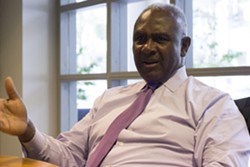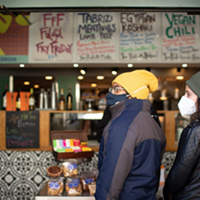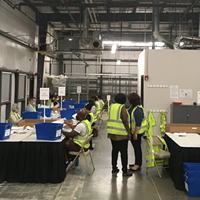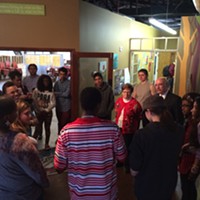An interview with Harvey Gantt
As part of our Creative Conversations series leading up to the DNC, we talked to the man who ran against Jesse Helms
By Mike CooperThough our votes were still too close to call when newly elected President Obama walked onto that stage in Chicago in November 2008, there was an enormous sense of justice and relief in North Carolina as volunteers and voters stood glued to the television, eyes filled with tears.
For some young voters on college campuses, it marked an achievement after months of campaigning. But for older blacks in Charlotte, there was a deeper sentiment stirring. And for those old enough to remember voting for Harvey Gantt, when he challenged Jesse Helms twice for the U.S. Senate in the '90s, there had to be a feeling of redemption.
A two-term mayor of Charlotte, Gantt generated a special kind of inspiration for minorities and liberals when he ran against Helms. Some say those races are the closet any political election in North Carolina has come to a contest between the worst side of America and the hope of what it could become.
But North Carolina wasn't quite ready to vote for the black candidate, so when Obama pulled ahead of John McCain statewide during the final hours of Election Day 2008, it was for many a moment both heaven-sent and historic.
For the second installment of our series of interviews to preview the Democratic National Convention, there was no individual more fitting to speak with than Gantt. Now the manager of Gantt Huberman Architects, he has played a major role in preparing for the DNC as a co-chairman of the Charlotte in 2012 Steering Committee. We sat down with the former mayor at his office on North Tryon Street to discuss the convention, what it means for Charlotte, and where he'll be when Obama speaks on Thursday.
Creative Loafing: Have you been paying much attention to this election cycle?
Harvey Gantt: Come on! I can't believe you asked that question. Of course I have been paying a lot of attention. We've been very much involved in the Democratic convention. You can't help but eat and sleep this stuff.
Are you surprised that North Carolina has become the battleground state?
There is no way Mitt Romney can win the election without North Carolina. There is no set of states that you can put together that leaves North Carolina out of his column. We are confident, though, that Obama will win North Carolina.
If Obama wins North Carolina, the election should be over, right?
You just said it. North Carolina and Virginia are very important. I'm not surprised that we are running a neck-and-neck race now with Romney because I think the demographics of the state are rapidly changing. When you see the growth of the Triangle and Charlotte and a lot of the urban areas of the state, and you ask the young people coming in which of the campaigns they identify with, most will probably say Obama's. This state is almost split down the middle between people who are moderate and progressive. There are the traditionalist who feel comfortable with an older way of life.
Do you think you're a modernizer or a populist?
By all means I felt like a modernizer. Back to the question of whether I was surprised that Obama would be close in this election, we have seen it getting closer each time. Clinton came close in North Carolina. The kinds of people that we elected to the Senate suggest there will always be an opportunity for a Democrat to do well. The fact that the Democratic legislature had been consistently in power up until 2010 tells you a lot about North Carolina, especially when you compare it to other Southern states that have gone heavily Republican. We are the only Deep South state, if you don't count Florida, that is a battleground state.
During your two campaigns for the U.S. Senate what did you learn about North Carolina? You probably travelled around most of it.
I think there are good people all across the spectrum, even the folks who didn't vote for me. They are hardworking, they want a fair break. If they work hard they feel there should be an opportunity to succeed. They want their kids to succeed. When I travelled, I saw people trying to meet challenges that were sometimes daunting. Those who lived in small towns where industry was leaving, those dependent on the tobacco economy, or on furniture or textiles. A lot of them were affected by a new global economy that was taking shape. In those places, people were a little more concerned about their future. In many ways, they held onto a conservative candidate because they thought maybe something else was causing their lives to change. Helms had that famous ad that said they were losing jobs because Harvey Gantt supports racial quotas, which was way off base. But it was designed to appeal to people who were really afraid that their conditions, their lifestyle, really depended on returning to some other way.
Do you think we've come a long way since then, when those tactics worked?
People are still using those same tactics but in a more sophisticated way. It is still easier to appeal to people's fears than it is to appeal to their hopes and aspiration. You can scare the hell out of people when you tell them that Social Security or Medicare are going away, or the Communists are coming to get you, or the gays and lesbians are coming to change your lifestyle. The remarkable thing about Obama's election in 2008 was that he absolutely overcame efforts to create fear in the minds of the voter.
There is a famous photograph of a young Obama wearing a Harvey Gantt for U.S. Senate T-shirt on election night in 1990. Were you aware of him then?
Oh no, not at all. I recall seeing that T-shirt for the first time in a The New York Times article about him back when he was becoming a serious candidate. I was flattered that he was aware of the campaign back in 1990, when he was in law school.
What does it mean for Charlotte, not only to host this big political convention, but to host and renominate the first black president?
We won't know for some time, but I think it's going to be transformative for the city. It will, in basically a few day's time, send a message out to the world. Whether it is a positive one that talks about this city developing into greatness, one that cares about its schools, the environment, issues of sustainability. One that has built a great downtown literally from nothing. That in Charlotte anything is possible. People walking around are going to be fascinated by what they are seeing, with residential development so close to downtown. This is ideally what people want to see a city develop into. And whether you're on the right or left of the political spectrum in Charlotte, everyone is engaged. So you see mean things and uplifting things in the newspapers. But people still care.
From a more partisan perspective, what is at stake in this election for Democrats?
Wait a minute, the whole future of the country is at stake right now. What I love about this coming election, with the selection of Paul Ryan as Romney's running mate, is the notion that in the last eight weeks of the campaign we are going to see a real debate about what our future is going to be. It is not going to boil down to whether or not he releases his income tax statements or some negative silliness about Obama. It is going to come down to what our future is going to be like and what is going to save the middle class. The differences are so stark that they will motivate people to choose the future they want. This is the kind of thing I thought about when I ran against Jesse Helms. I like those kinds of elections, and I like the notion that Charlotte is one of the jumping off points.
A big part of Obama coalition in 2008 were young people and blacks, especially in North Carolina. Young people are having a difficult time finding work, and the black community has had it tough, particularly in certain parts of Charlotte. Will it be harder to fire them up and get them out to vote?
Of course. The second time around for Obama was always going to be tough. I think even if we had a 5 percent unemployment rate, it would have been tougher generating the enthusiasm. But let me go back to the point you made. I think the economy has sobered students. What I mean by that is, they are going to leave school in debt, and the prospect of finding a job that will liquidate that debt within reasonable time doesn't look very good right now. The question is which of these candidates will offer them the best opportunity. Obama recognizes the second time around that he's not the new guy on the block anymore. He's going to have blend hope and the prospect of change for a very difficult world.
What is going to go through your mind as Obama speaks on Thursday, and what emotions will you feel?
I expect to be right there, front and center. I am going to say, "When I came to Charlotte 47 years ago, could I have ever imagined that I was going to be listening to a black president accept the nomination for the second time in North Carolina, in Charlotte?" We have, in my mind, exceeded all the expectations I could have ever dreamed about. It will be a seminal moment for our city.
You played a major role in getting us there.
I don't know about all that. There are a lot of people who got Charlotte to move in that direction. But it's going to be a great time.
Speaking of...
Latest in DNC News
More by Mike Cooper
Calendar
-

Wine & Paint @ Blackfinn Ameripub- Ballantyne
-

Face to Face Foundation Gala @ The Revelry North End
-
An Evening With Phil Rosenthal Of "Somebody Feed Phil" @ Knight Theater
-
Kountry Wayne: The King Of Hearts Tour @ Ovens Auditorium
-

Queen Charlotte Fair @ Route 29 Pavilion
-
Esports in Charlotte Takes Off: A Guide to Virtual Competitions and Betting
-
Canuck in the Queen City 7
A Canadian transplant looks back at her first year as a Charlotte resident
-
Lewis family launches Twelve In Twelve 1
The nonprofit hopes to raise money for 12 organizations around the world and encourage 'voluntourism'


















